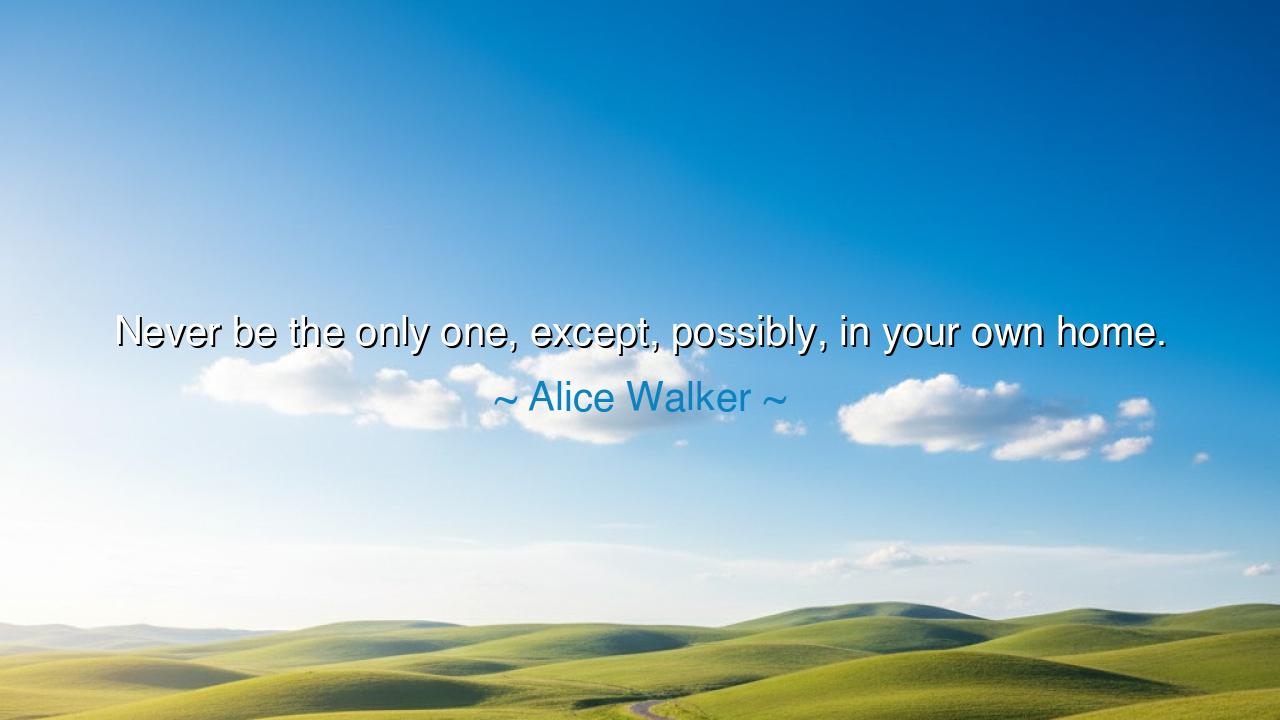
Never be the only one, except, possibly, in your own home.






In the councils of survival, a compact sentence rings like a bell of warning and welcome: “Never be the only one, except, possibly, in your own home.” Hear how it divides the world into two realms. Out there, in marketplaces and meeting rooms, the desert is dangerous for solitary travelers; inside, at the hearth, the soul may reign singular and unashamed. The saying counsels both prudence and dignity: refuse the isolating pedestal that makes you a spectacle, and guard the inner chamber where your irreducible self is sovereign.
To be the only one is to be made emblem and experiment at once. The eye of the crowd grows sharp; mistakes are magnified; silence becomes a second labor. The ancients knew this. A lone envoy sent into a hostile city wore not just his cloak but his people’s fate. So it is with those who walk into rooms where no kinship waits—the first woman on a board, the first immigrant in a shop, the first dissenter in a chorus of easy cheer. The proverb does not bid you flee such rooms forever; it bids you resist remaining there alone. Carry others in with you, make allies, build a quorum of voices so the wind cannot strip you bare.
Consider Shirley Chisholm, the first Black woman elected to the U.S. Congress. When she entered that chamber, history would have made of her a solitary monument. She refused. She forged caucuses, stitched coalitions, and said, “If they don’t give you a seat at the table, bring a folding chair.” That is the art of unlearning loneliness in public: turn the solitary assignment into a collective project; refuse the cruel theater of tokenism by multiplying presence. In this, she transformed the room from a stage of scrutiny into a workshop of change.
Or think on Katherine Johnson at NASA, whose calculations helped sling human courage against the sky. In halls not built for her, she did the math—and then she did more: she mentored, she taught, she drew others near the fire of numbers. Her brilliance mattered; her refusal to be the only one mattered more for the generations that followed. When one becomes two, and two becomes ten, the burden of symbol lightens and the work of justice hastens.
Why, then, the sheltering exception—“except, possibly, in your own home”? Because the house of your spirit is the citadel where you must be unrepeatable. There, do not dilute your edges to soothe strangers. There, let the wild grammar of your being speak plainly. To govern one’s home is to keep a sanctuary from the world’s appetite for sameness. The self needs a room where it is not representative, not required to explain, not reduced to lesson or landmark. That private sovereignty nourishes the strength to rejoin the multitudes without dissolving into them.
The meaning, then, is double: seek community in public so you cannot be caged as a curiosity; seek authenticity in private so you cannot forget your name. Let belonging be your shield in the square and singularity your crown by the fire. To live otherwise is to walk either unguarded or unrooted—first consumed by isolation, then by imitation.
Take the lesson into your days. Do not enter hard rooms alone if you can help it; invite another, or become the inviter others needed. When you cannot multiply bodies, multiply bonds—find mentors, allies, and accomplices who will answer when you call. In your home, practice the rites that keep you whole: speak your mother tongue, cook the food of your memory, pray or sing as your blood instructs. Then step out again, not as the fragile only one, but as one of many—anchored, accompanied, and ready.
Practical rites: (1) Before any high-stakes gathering, name three allies and a shared aim; make a plan to signal and support one another. (2) Refuse token roles—ask for resources, partners, and authority proportionate to the task. (3) Mentor one person behind you; bring one peer beside you; greet one elder ahead of you—break the chain of singularity. (4) In your home, keep a daily ritual that proclaims your unborrowed self. Do these, and you will walk the earth neither lonely nor lost—many in the streets, one at the hearth—and the proverb will have done its saving work.






AAdministratorAdministrator
Welcome, honored guests. Please leave a comment, we will respond soon